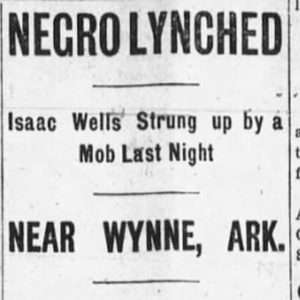calsfoundation@cals.org
Elias Wells (Lynching of)
On November 20, 1902, an African American man named Wells was lynched in Wynne (Cross County) for allegedly attempting to cut the throat of Max Campbell, a conductor on the St. Louis, Iron Mountain and Southern Railroad. Accounts vary as to Wells’s first name. Several newspapers call him Lige, while others give his name as Isaac. He is listed as Lige at the National Memorial for Peace and Justice in Alabama. Newspapers reported that Wells was from Augusta (Woodruff County), and there is some information available in public records that indicates that Wells’s first name may have been Elias. The 1900 federal census lists twenty-two-year-old Elisa Wells (male) living in DeView Township in Woodruff County. He was literate, working as a farmer, and owned his own home. In January of that same year, Elias Wells, still age twenty-two, married Marzella Lockett in Woodruff County. (Lige could well have been a variant form of Elias.)
On November 21, 1902, the Arkansas Democrat, in the most extensive report on the situation, indicated that one Isaac Wells of Augusta had been lynched the previous evening by a mob of a dozen men. Wells reportedly boarded the train at Augusta to travel to McCrory (Woodruff County). Before they reached McCrory, he and conductor Campbell apparently argued over the fare. After they arrived at McCrory, Campbell had words with Wells, whereupon Wells drew a knife. Although he struck at Campbell’s neck, Campbell’s stiff shirt collar deflected the blow, and the Indiana Journal reported that he was only slightly wounded. Wells was arrested and faced a preliminary hearing at McCrory. There, he was bound over to court and jailed.
That same day, Deputy Sheriff Patterson decided to take Wells to the jail in Forrest City (St. Francis County). The train would pass through Wynne, and Wells was transferred to the caboose; only the flagman and Patterson were with him. Near Wynne, a dozen men, some of them masked, seized Wells. They all remained on the train until they neared the depot, at which point the lynching party and Wells leaped off. Patterson was unable to leave the train until it traveled a mile farther. He informed authorities about what had happened, and they formed a search party to find Wells and the members of the mob.
Their first search was unsuccessful, but three hours later, Wells’s body was found near the spot where the mob had forced Wells from the train. The Democrat reported that Patterson, who saw mob members’ hands, said they were all white men. However, the “perpetrators are unknown outside the circles of those implicated,” and the newspaper expressed the belief that “the party…came from some other point.”
In a second Democrat article published on November 24, reporters corrected their earlier account and indicated that Wells’s first name was Elias. The Cross County coroner was not available to do an inquest, and a justice of the peace assembled a jury that determined that “Elias Wells came to his death at the hands of unknown parties by hanging him by the neck and a blow in the back of his head.” Other sources indicated that the blow to the head had killed him before he was hanged.
For additional information:
“At Hands of Unknowns.” Arkansas Democrat, November 24, 1902, p. 2.
“Negro Lynched.” Arkansas Democrat, November 21, 1902.
“Probably Lynched.” Indianapolis Journal, November 21, 1902, p. 2.
Nancy Snell Griffith
Davidson, North Carolina








Comments
No comments on this entry yet.